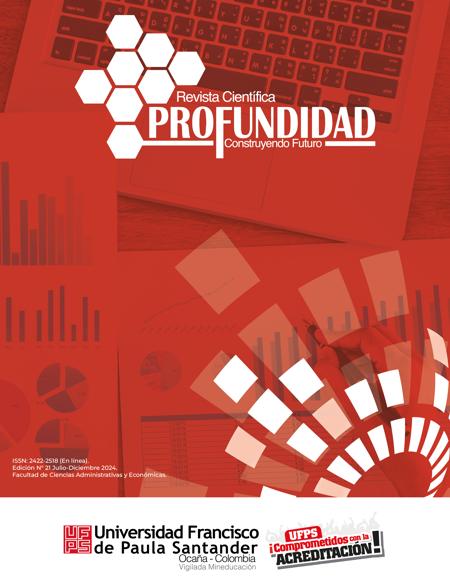Theoretical Analysis of Life Cycle Optimization of Materials Using Artificial Intelligence and Big Data Technologies: Reuse Strategies in the Circular Economy
Análisis Teórico de la Optimización del Ciclo de Vida de Materiales mediante Tecnologías de Inteligencia Artificial y Big Data: Estrategias de Reutilización en la Economía Circular
Main Article Content
This study emphasizes the revolution represented by the integration of Artificial Intelligence (AI) and Big Data in sustainability and resource efficiency. These technologies improve materials management and foster innovative reuse strategies, essential for the transition to a circular economy. The study uses a qualitative grounded theory approach implementing techniques such as literature review and document analysis. The results highlight the need for a multidisciplinary approach in the integration of advanced technologies, combining technical skills with a deep understanding of business models and market dynamics, continuous education and training in AI and Big Data, as well as collaboration between companies, educational institutions and government entities are essential to promote innovation and adoption of these technologies in the circular economy. Finally, we conclude on the importance of integrating advanced technologies in materials management and the need for a holistic approach that combines technological innovations with changes in business models and management practices, emphasizing interdisciplinary collaboration and adaptation to specific contexts to face sustainability challenges.
Downloads
Article Details
Ametller, D. C. (2019). The rulemaking process before technological advance and digital transformation (artificial intelligence social networks and Big Data ). Revista General de Derecho Administrativo, 2019(50). URL: https://www.iustel.com/v2/revistas/detalle_revista.asp?id_noticia=421169&d=1
Arias-Meza, M., Alvarez-Risco, A., Cuya-Velásquez, B. B., Gómez-Prado, R., de las Mercedes Anderson-Seminario, M., & Del-Aguila-Arcentales, S. (2023). Theory of Sustainable Paths for Entrepreneurship Associated with Fashion and Practical Examples. En Environmental Footprints and Eco-Design of Products and Processes (pp. 89-116). https://cris.usil.edu.pe/en/publications/theory-of-sustainable-paths-for-entrepreneurship-associated-with- DOI: https://doi.org/10.1007/978-981-19-8895-0_4
Betancourt Morales, C. M., & Zartha Sossa, J. W. (2020). Circular economy in Latin America: A systematic literature review. Business Strategy and the Environment, 29(6), 2479-2497. URL: https://doi.org/10.1002/bse.2515 DOI: https://doi.org/10.1002/bse.2515
Bohorquez-Lopez, V. W. (2022). Digital transformation in crisis situations. Literature review using topic modeling and grounded theory. Cuadernos de Administracion, 35(1). https://doi.org/10.11144/Javeriana.cao35.tdscrl. DOI: https://doi.org/10.11144/Javeriana.cao35.tdscrl
Carrión, J. R. H. (2022). Deconstructing the “peer-to-peer sharing economy”: The challenge of the collaborative economy to platform co-operatives in the post-labor age of the 21st Century. CIRIEC-Espana Revista de Economia Publica Social y Cooperativa, 105, 177-204. https://doi.org/10.7203/CIRIEC-E.105.17784. DOI: https://doi.org/10.7203/CIRIEC-E.105.17784
Ferreira, I. A., Godina, R., Pinto, A., Pinto, P., & Carvalho, H. (2023). Boosting additive circular economy ecosystems using blockchain: An exploratory case study. Computers and Industrial Engineering, 175, 108916. https://doi.org/10.1016/j.cie.2022.108916. DOI: https://doi.org/10.1016/j.cie.2022.108916
Franz, N. M., & da Silva, C. L. (2022). Waste Electrical and Electronic Equipment (WEEE): Global and contemporary challenge to production chains and the urban environment. Gestao e Producao, 29(e6621). https://doi.org/10.1590/1806-9649-2022v29e6621. DOI: https://doi.org/10.1590/1806-9649-2022v29e6621
Gil-Lamata, M., & Latorre-Martínez, M. P. (2022). The Circular Economy and Sustainability: A Systematic Literature Review. Cuadernos de Gestion, 22(1), 129-142. https://doi.org/10.5295/CDG.211492MG. DOI: https://doi.org/10.5295/cdg.211492mg
Hamam, M., et al. (2021). Circular economy models in agro-food systems: A review. Sustainability (Switzerland), 13(6), 3453. URL: https://doi.org/10.3390/su13063453 DOI: https://doi.org/10.3390/su13063453
Liu, Q., Yang, L., & Yang, M. (2021). Digitalisation for water sustainability: Barriers to implementing circular economy in smart water management. Sustainability (Switzerland), 13(21), 11868. https://doi.org/10.3390/su132111868. DOI: https://doi.org/10.3390/su132111868
Sousa, M. J., & Rocha, Á. (2019). Skills for disruptive digital business. Journal of Business Research, 94, 257-263. URL: https://www.sciencedirect.com/science/article/abs/pii/S0148296317305544?via%3Dihub DOI: https://doi.org/10.1016/j.jbusres.2017.12.051
Zukaib, U., Cui, X., Hassan, M., Harris, S., Hadi, H. J., & Zheng, C. (2023). Blockchain and Machine Learning in EHR Security: A Systematic Review. IEEE Access, 11, 130230-130256. https://doi.org/10.1109/ACCESS.2023.3333229. DOI: https://doi.org/10.1109/ACCESS.2023.3333229










